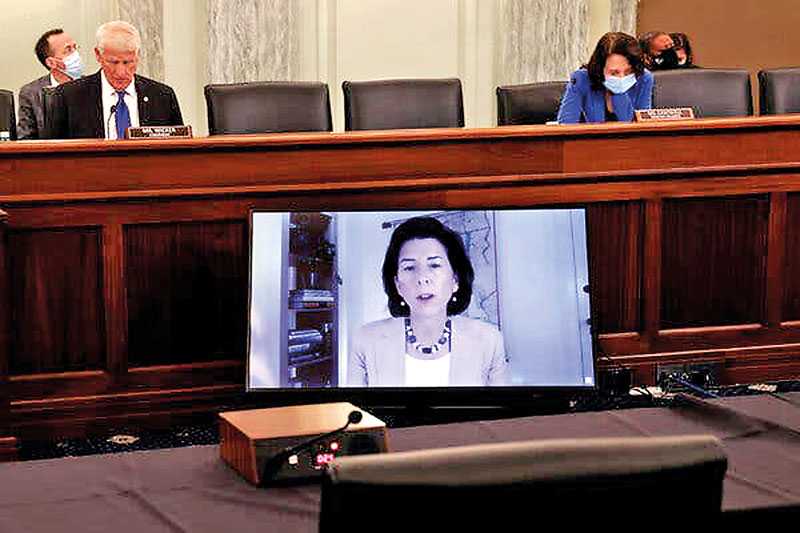Monday Feb 16, 2026
Monday Feb 16, 2026
Thursday, 28 January 2021 00:25 - - {{hitsCtrl.values.hits}}

Governor Gina Raimondo testifies remotely via videoconference during a Senate Commerce, Science and Transportation Committee hearing on her nomination to be Commerce secretary as Chairman Roger Wicker (R-MS) and Ranking Member Maria Cantwell listen on Capitol Hill in Washington - Reuters
WASHINGTON, (AFP): Gina Raimondo, President Joe Biden's nominated choice for commerce secretary, has pledged during a Senate confirmation hearing to be tough on China for “anti-competitive” trade practices.
President Donald Trump harangued China over a range of topics, launching a stinging trade war that imposed billions of dollars in tariffs on Chinese goods.
The new US president is expected to remain tough on the superpower rival, and Raimondo said Tuesday that China has “clearly behaved in ways that are anti-competitive... which hurts American workers and hurts the ability of our companies to compete.” “Should I be confirmed, I plan to be very aggressive, to help Americans compete against the unfair practices of China,” she told lawmakers.
Raimondo – the first woman governor of the US state of Rhode Island – said she supported Biden's position that the United States would consult its allies to restore fair trade with Beijing.
But she did not commit to keeping telecom giant Huawei or other Chinese companies on the US blacklist due to allegations that they pose a risk to US national security.
However, Raimondo did promise to use the powers of the commerce department “to protect Americans and our network from Chinese interference,” adding: “that's Huawei, ZTE, or any other company.” Beijing has called for a reset in relations between Beijing and Washington after a corrosive period of diplomacy under Trump.
But when asked about Raimondo's comments, the foreign ministry said it would “continue taking necessary measures to safeguard Chinese companies' legitimate rights and interests”.
“The last US administration pursued unilateral protectionism and bullying practices, maliciously started a trade war... and did everything to suppress Chinese companies,” foreign ministry spokesman Zhao Lijian said at a routine briefing.
“We hope the US can learn a lesson and correct its mistakes, and earnestly respect the principles of the market economy and fair competition.” During the Trump administration, the commerce department cracked down on Chinese tech companies suspected of industrial espionage or of compromising US national security.
Former commerce secretary Wilbur Ross broadened the list of companies that can't trade with US companies without a prior license, which grew to include Chinese telecom giants like Huawei and ZTE.
In December, just weeks before his departure, the Trump administration added Chinese computer chip maker Smic to the blacklist, limiting the company's access to high-end US technologies due to its alleged links with the Chinese military.
